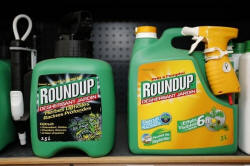|
 EU
set to consider temporary extension of glyphosate license over cancer
row EU
set to consider temporary extension of glyphosate license over cancer
row
 Send a link to a friend
Send a link to a friend
[June 01, 2016]
By Alissa de Carbonnel
BRUSSELS (Reuters) - The European
Commission will propose a temporary 12 to 18 month extension of EU
authorization for the weed killer glyphosate, used in Monsanto's
Roundup, to allow time for a new scientific study into fears it may
cause cancer.
|
|
 After failing to win support for an initial proposal for a 15-year
approval, the EU executive proposed the compromise to avoid a
six-month phase-out period when the current license lapses at the
end of June. After failing to win support for an initial proposal for a 15-year
approval, the EU executive proposed the compromise to avoid a
six-month phase-out period when the current license lapses at the
end of June.
The proposal will be put to a vote by experts from the 28 EU nations
on Monday.
"The ball is now in the member state court," the EU Commissioner for
Health and Food Safety, Vytenis Andriukaitis, said.
The compromise could enable member states that opposed license
renewal, such as France, to change their position, EU sources said,
speaking on condition of anonymity.
If the new proposal fails to win support from the 28 EU nations, it
will go to an appeal committee vote, although the compromise says
the Commission can take a decision regardless of what emerges from
the committee.

Andriukaitis said he hoped a study by the European Union's Agency
for Chemical Products (ECHA) would allay health concerns following a
transatlantic row over whether glyphosate may cause cancer.
"Under the EU law, the last word belongs to the ECHA," Andriukaitis
told reporters in Brussels.
Contradictory findings on the carcinogenic risks of glyphosate by
scientific bodies and public campaigning by citizens' groups and
non-governmental organizations have thrust glyphosate into the
center of a dispute among EU and U.S. politicians, regulators and
researchers. In May, German chemicals group Bayer offered $62
billion to buy U.S. seeds company Monsanto, despite German
resistance to glyphosate and Monsanto's genetically modified seeds.
[to top of second column] |

Experts from the U.N.'s Food and Agriculture Organization (FAO) and
World Health Organization (WHO) said last month glyphosate was
unlikely to pose a risk to humans exposed to it through food. It is
mostly used on crops.
The finding matches that of the European Food Safety Authority (EFSA),
an independent agency funded by the European Union, but runs counter
to a March 2015 study by the WHO's Lyon-based International Agency
for Research on Cancer (IARC).
That agency said glyphosate was probably able to cause cancer in
humans and classified it as a 'Group 2A' carcinogen. It said it
assessed whether the substance can cause cancer in any way -
regardless of real-life conditions on typical levels of human
exposure or consumption.
(Editing by Barbara Lewis and Adrian Croft)
[© 2016 Thomson Reuters. All rights
reserved.] Copyright 2016 Reuters. All rights reserved. This material may not be published,
broadcast, rewritten or redistributed.
 |